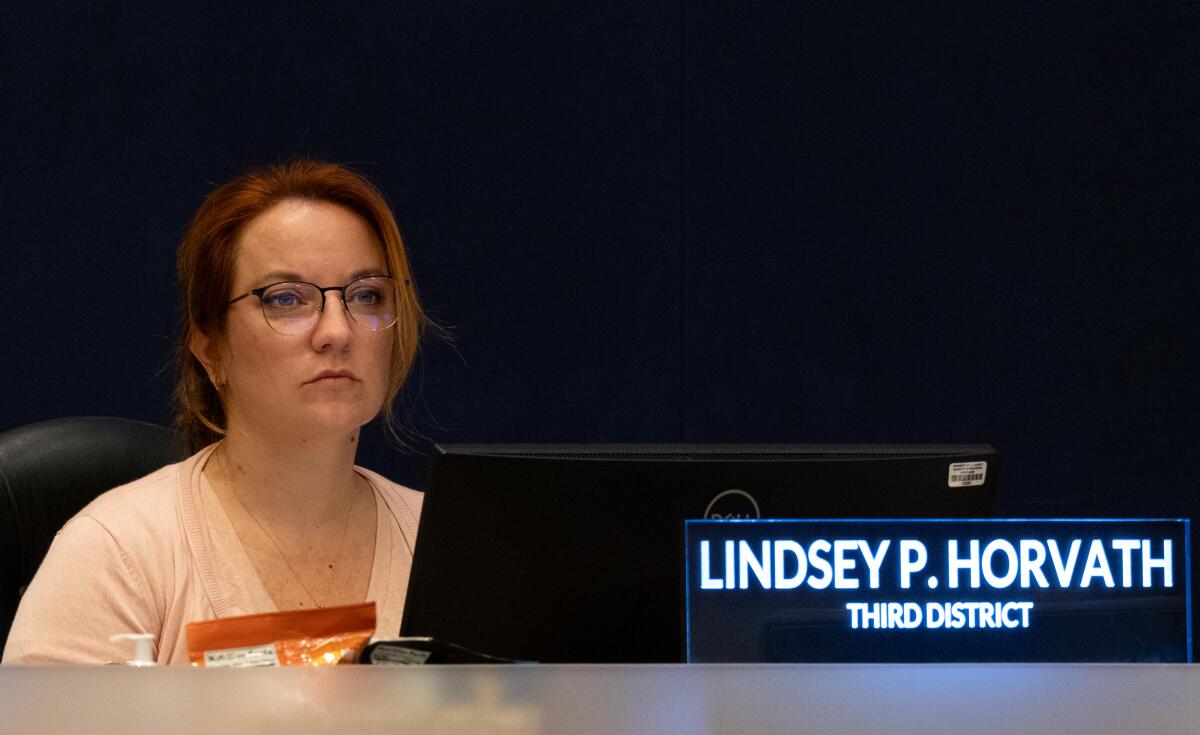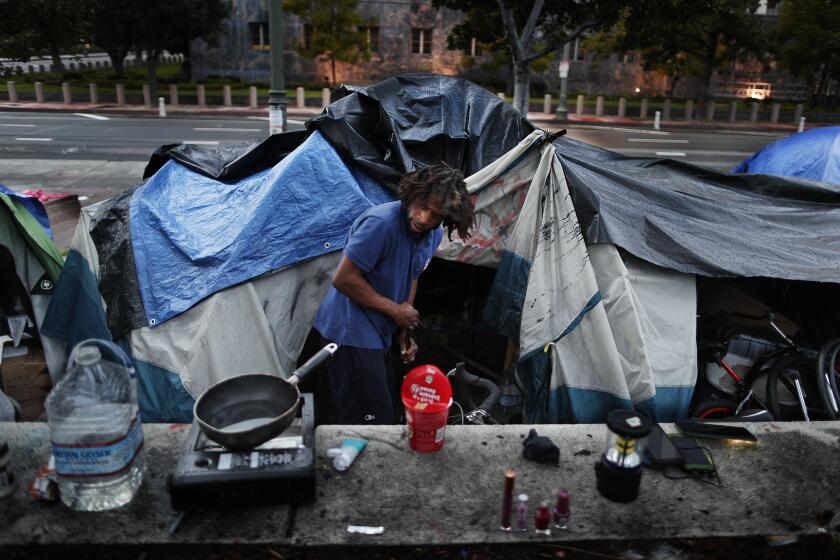L.A. County delays implementation of new criteria for gravely disabled

- Share via
The Los Angeles County Board of Supervisors voted Tuesday to delay the implementation of Senate Bill 43, the landmark legislation that expands the criteria by which people can be detained against their wills by police, crisis teams and mental health providers.
The motion to delay, proposed by Supervisor Lindsey Horvath, was passed on a 4-1 vote. L.A. County now joins 45 other counties that have formally declared their intention to hold off implementation. Supervisor Janice Hahn cast the lone dissenting vote.
“I know there are people on our streets who are not going to survive and maybe would have a chance if we implemented this sooner to help them get the treatment that they need,” Hahn said to her colleagues.
SB 43 gave counties the option to implement the law either at the start of 2024 or not until Jan. 1, 2026. In her motion, Horvath cited “the immense amount of work” required to implement the law, which adds severe substance use disorder to the longstanding definition of gravely disabled.
“We cannot afford the liability cases and the risk of civil right violations and risk getting this wrong,” Horvath said at the board meeting.
Passed by state legislators in September and signed by Gov. Gavin Newsom in October, SB 43 represents the first major revision of the state’s 1967 conservatorship law, the Lanterman-Petris-Short Act.
It is intended to address not only the epidemic of mental illness among homeless populations in the state but also the proliferation of highly addictive drugs, such as fentanyl and methamphetamine, which researchers say exacerbate psychotic disorders.
However, according to the motion, the size of the crisis presents logistical problems for counties responsible for administering involuntary holds that proceed conservatorship hearings. Adding severe substance use disorder to the definition of gravely disabled would lead to an increase of those involuntarily detained, according to the supervisor’s motion.
Sacramento lawmakers approved changes to California’s landmark behavioral health law. The measure now goes to Gov. Gavin Newsom.
Los Angeles County joins a majority of counties across the state tapping the brakes on what Newsom considers crucial legislation for transforming California’s behavioral health landscape. Last week, he lambasted those who chose to wait.
“You have a crisis out there,” he said at a news conference. “There is a crisis on the streets, and people are talking about delaying the conservatorship efforts until 2026. We can’t afford to wait. The state has done its job. It’s time for the counties to do their job … with a deeper sense of urgency. They have to recognize that people are dying on their watch. People are literally losing their lives, and we can’t waste another day.”
The supervisors’ decision to delay comes three weeks after the county Department of Mental Health issued a report on the feasibility of implementing SB 43 at the start of the new year. Written in conjunction with the county Department of Public Health’s Bureau of Substance Abuse Prevention and Control, the report recommended holding off on implementation.
Among the reasons was the need to increase training to ensure appropriate and consistent understanding of the definition of “grave disability” among those qualified to initiate an involuntary hold and perhaps most crucially, to address a shortage of treatment facilities for those with medical, substance use and mental health treatment needs.
The county currently has no locked facilities for treating substance use disorder.
“Our mental health service system, while larger than it was in the 1960s, is still under-resourced and under-staffed,” according to Horvath’s motion, which references the “disastrous results” of not developing community services following the closure of state psychiatric hospitals in the 1970s. “This board cannot afford to make the same mistakes that our state leaders did decades ago.”
California voters will be asked to decide on a ballot measure in March 2024 that includes a $6.38-billion bond to pay for mental health housing and services.
Prior to the vote, Hahn had expressed disappointment with efforts to stall SB 43.
“We have a drug addiction and mental health crisis on our streets, and I want to see a sense of urgency from our county departments,” she said in a statement. “I think we can get this done sooner, and I want to see us try.”
In a letter of support for the motion, the Hospital Assn. of Southern California, representing 170 hospitals in six counties, recommended waiting.
“The current behavioral health system is not prepared to support the influx of new patients meant to be served by this law and our hospital emergency departments are not prepared to hold and care for these patients until we can identify appropriate treatment,” wrote Adena Tessler, a regional vice president with the group. “A rushed implementation of this expanded definition, without proper preparation, is not in the best interest of the very patients it is intended to help.”
San Francisco and San Luis Obispo counties have indicated that they will implement SB 43 at the start of the new year, and last week by a vote of 3 to 2, the San Diego County Board of Supervisors agreed to delay implementation until January 2025, when it will reevaluate its readiness to adapt the new criteria ahead of the 2026 deadline.
But “the expectation is that it will be implemented within a year,” said Luke Bergmann, director of behavioral health services for San Diego County.
While logistical constraints have led to the decision to delay implementation, there is also concern that SB 43 might be challenged in court as an impingement upon civil liberties. Soon after the CARE Act was passed in 2022, three civil rights groups challenged the law in court. Their petition was ultimately dismissed.
Although no lawsuit has been filed against SB 43, Disability Rights California, which opposed the legislation, argued against a hurried roll-out.
“It’s really disheartening to hear the governor criticize counties for exercising an option — deferral — he agreed to in SB 43,” said Deb Roth, a senior legislative advocate. “It seems very short-sighted not to want county-readiness before implementing such major changes.”
More to Read
Sign up for Essential California
The most important California stories and recommendations in your inbox every morning.
You may occasionally receive promotional content from the Los Angeles Times.
















